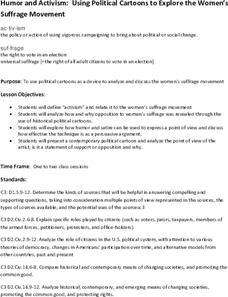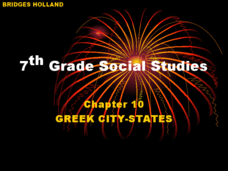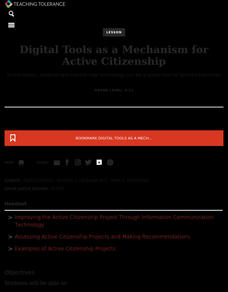Annenberg Foundation
Service Learning in the Social Studies
Active Citizenship Today (ACT) is a "unique social studies service learning program" that requires students to learn about the public policy associated with community issues they identify in their local community. This web site provides...
PBS
“He Named Me Malala”: Understanding Student Activism Through Film
Malala Yousafzai has become the face of social activism. After watching He Named Me Malala and short student-made films about what young people can do to become instruments of change, class members reflect on what it means to be an...
Facing History and Ourselves
Social Media and Ferguson
How can social media help or hinder civil dialogue? How can information shared on social media be verified? As the investigation of media reports of the events surrounding the shooting of Michael Brown continues, class members read news...
National Endowment for the Humanities
The House Un-American Activities Committee
Was the House Un-American Activities Committee justified in investigating subversive influences in the entertainment industry? Part two of the three-part series of lessons that examine the anti-communism movement after World War II,...
Macmillan Education
Social Skills
Every culture has a set of social skills one must learn to establish and maintain relationships. Some of these skills are particular to a culture and some are universal. Class members practice using appropriate language, polite manners,...
Historical Thinking Matters
Social Security: 3 Day Lesson
What does social security reveal about the political and social culture of the 1930s? After beginning with a brief introductory video on the impact of the Great Depression and how various Americans, such as Huey Long and Francis...
National Woman's History Museum
Humor and Activism
As part of their study of the women's suffrage movement, groups analyze political cartoons and drawings. They create a caption for an image from the time, add an exhibit label that provides a context for their drawing, and post as part...
MENSA Education & Research Foundation
Utopia/Dystopia: The American Dream
America was founded by dreamers, and the American dream still resonates in our country today. Track the American dream from its Puritan beginnings to its optimistic descendants with a instructional activity that focuses on speeches by...
Teaching Tolerance
Mass Incarceration as a Form of Racialized Social Control
Mass incarceration: A result of a tough stance on crime or racial discrimination, you decide. Academics explore the history and reasons behind mass incarcerations in the United States and its impact on ethnic communities. The...
Teaching Tolerance
Using Photographs to Teach Social Justice | Supporting Social Border Crossings
A lunch-time activity encourages pupils to step out of their usual lunch bunch and connect with someone new. To begin, individuals examine a group photograph and identify what they believe is the gender, race, religion, and sexual...
Curated OER
7th Grade Social Studies: Chapter 10, Greek City-States
Doubling as a lecture and series of class activities, this presentation takes your students through many important aspects of ancient Greek culture. In addition to great information about ancient Greece, the presentation intersperses...
Macmillan Education
Study Skills
Good study habits are key to success in school. The activities in this packet are designed to get kids thinking about improvements they could make in their study habits.
Teaching Tolerance
Jim Crow as a Form of Racialized Social Control
Just because slavery was illegal doesn't mean it went away ... Jim Crow Laws took its place. An eye-opening lesson focuses on how Jim Crow Laws were used as a form of racial social control against African Americans in the United States....
Encyclopedia Britannica
Meta-Study: Political Brains
Are there differences in the brains of liberals and conservatives? That is the question young political scientists are challenged to answer. Class members examine studies, consider how the results are presented, and how the studies were...
Facing History and Ourselves
Citizen Watchdogs and the News
To conclude their case study of media coverage of the shooting of Michael Brown by a Ferguson, Missouri, police officer, class members consider the role of citizen watchdogs in a democratic society, develop strategies for combating...
Visa
Financial Forces: Understanding Taxes and Inflation
Take the opportunity to offer your young adults some important financial wisdom on the way taxes and inflation will affect their lives in the future. Through discussion and review of different real-world scenarios provided in this...
Curated OER
Lesson: Emory Douglas: Art and Activism
Visual literacy can be experienced in many different ways. Learners discuss the times, graphic art, and cultural significance of activism in art as they explore artist and Black Panther, Emory Douglas. This is a discussion-based lesson...
K20 LEARN
But What About Me?: Teaching Perspective In The Social Studies Classroom
How would the story of the discovery of America be different if indigenous people told it through their eyes? Individuals compare the conventional account of this moment in history to an account given by one of the native peoples. After...
Historical Thinking Matters
Social Security: 5 Day Lesson
Did the New Deal fundamentally shift the role of the American government in the economy? Your class members will examine the interpretations of various historians in answering this question, and use a variety of primary and secondary...
Museum of Tolerance
Can It Happen in America?: Taking Social Action
Class members investigate the Jim Crow Laws, Executive Order 9066, the Chinese Exclusion Act, and the Indian Removal Act to gather information about not only the challenges encountered by diverse groups of Americans, but their...
Teaching Tolerance
Using Photographs to Teach Social Justice | Advertisements Promoting Activism
Activism can create real change. Class members examine a series of photographs that represent a different form of activism. Individuals then craft a persuasive speech in which they argue why the photo they chose is the best example of...
Teaching Tolerance
Using Photographs to Teach Social Justice | Showcasing Your Understanding
The final instructional activity in the series asks class members to demonstrate what they have learned about how photographs can revel injustice and how they can encourage people to take action against injustice. Either as a class, in...
Teaching Tolerance
Digital Tools as a Mechanism for Active Citizenship
How is technology a useful tool for active citizenship? Pupils assume the role of technology consultants reviewing citizenship projects. Small groups collaborate to make recommendations about how to incorporate technology to improve...
PBS
Universal Declaration of Human Rights
What rights are guaranteed to students? Do they align with the Universal Declaration of Human Rights, which was approved by the United Nations in 1948? Middle and high schoolers present persuasive arguments about the rights they believe...

























